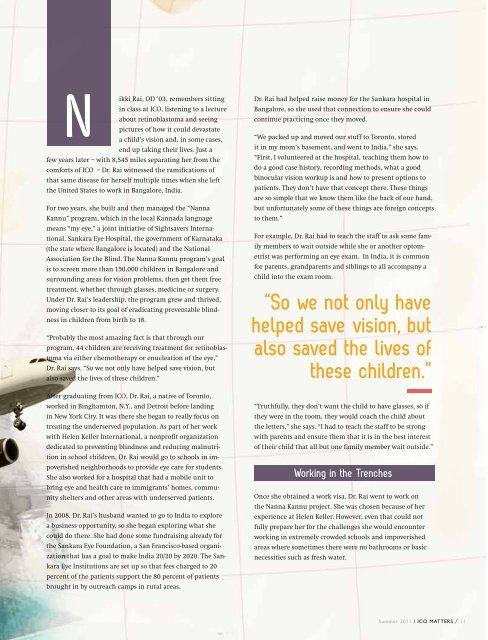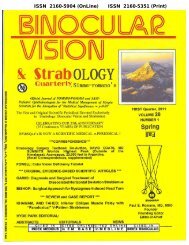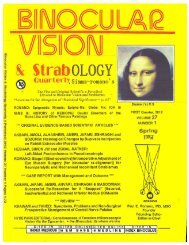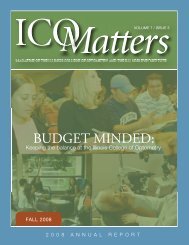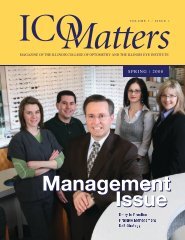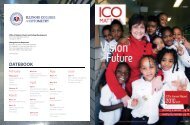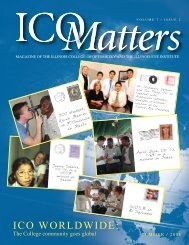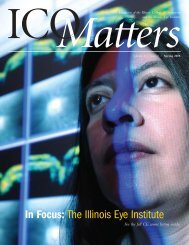Seeing the World - Illinois College of Optometry
Seeing the World - Illinois College of Optometry
Seeing the World - Illinois College of Optometry
You also want an ePaper? Increase the reach of your titles
YUMPU automatically turns print PDFs into web optimized ePapers that Google loves.
n<br />
ikki Rai, OD ’03, remembers sitting<br />
in class at ICO, listening to a lecture<br />
about retinoblastoma and seeing<br />
pictures <strong>of</strong> how it could devastate<br />
a child’s vision and, in some cases,<br />
end up taking <strong>the</strong>ir lives. Just a<br />
few years later – with 8,545 miles separating her from <strong>the</strong><br />
comforts <strong>of</strong> ICO – Dr. Rai witnessed <strong>the</strong> ramifications <strong>of</strong><br />
that same disease for herself multiple times when she left<br />
<strong>the</strong> United States to work in Bangalore, India.<br />
For two years, she built and <strong>the</strong>n managed <strong>the</strong> “Nanna<br />
Kannu” program, which in <strong>the</strong> local Kannada language<br />
means “my eye,” a joint initiative <strong>of</strong> Sightsavers International,<br />
Sankara Eye Hospital, <strong>the</strong> government <strong>of</strong> Karnataka<br />
(<strong>the</strong> state where Bangalore is located) and <strong>the</strong> National<br />
Association for <strong>the</strong> Blind. The Nanna Kannu program’s goal<br />
is to screen more than 150,000 children in Bangalore and<br />
surrounding areas for vision problems, <strong>the</strong>n get <strong>the</strong>m free<br />
treatment, whe<strong>the</strong>r through glasses, medicine or surgery.<br />
Under Dr. Rai’s leadership, <strong>the</strong> program grew and thrived,<br />
moving closer to its goal <strong>of</strong> eradicating preventable blindness<br />
in children from birth to 18.<br />
“Probably <strong>the</strong> most amazing fact is that through our<br />
program, 44 children are receiving treatment for retinoblastoma<br />
via ei<strong>the</strong>r chemo<strong>the</strong>rapy or enucleation <strong>of</strong> <strong>the</strong> eye,”<br />
Dr. Rai says. “So we not only have helped save vision, but<br />
also saved <strong>the</strong> lives <strong>of</strong> <strong>the</strong>se children.”<br />
After graduating from ICO, Dr. Rai, a native <strong>of</strong> Toronto,<br />
worked in Binghamton, N.Y., and Detroit before landing<br />
in New York City. It was <strong>the</strong>re she began to really focus on<br />
treating <strong>the</strong> underserved population. As part <strong>of</strong> her work<br />
with Helen Keller International, a nonpr<strong>of</strong>it organization<br />
dedicated to preventing blindness and reducing malnutrition<br />
in school children, Dr. Rai would go to schools in impoverished<br />
neighborhoods to provide eye care for students.<br />
She also worked for a hospital that had a mobile unit to<br />
bring eye and health care to immigrants’ homes, community<br />
shelters and o<strong>the</strong>r areas with underserved patients.<br />
In 2008, Dr. Rai’s husband wanted to go to India to explore<br />
a business opportunity, so she began exploring what she<br />
could do <strong>the</strong>re. She had done some fundraising already for<br />
<strong>the</strong> Sankara Eye Foundation, a San Francisco-based organization<br />
that has a goal to make India 20/20 by 2020. The Sankara<br />
Eye Institutions are set up so that fees charged to 20<br />
percent <strong>of</strong> <strong>the</strong> patients support <strong>the</strong> 80 percent <strong>of</strong> patients<br />
brought in by outreach camps in rural areas.<br />
Dr. Rai had helped raise money for <strong>the</strong> Sankara hospital in<br />
Bangalore, so she used that connection to ensure she could<br />
continue practicing once <strong>the</strong>y moved.<br />
“We packed up and moved our stuff to Toronto, stored<br />
it in my mom’s basement, and went to India,” she says.<br />
“First, I volunteered at <strong>the</strong> hospital, teaching <strong>the</strong>m how to<br />
do a good case history, recording methods, what a good<br />
binocular vision workup is and how to present options to<br />
patients. They don’t have that concept <strong>the</strong>re. These things<br />
are so simple that we know <strong>the</strong>m like <strong>the</strong> back <strong>of</strong> our hand,<br />
but unfortunately some <strong>of</strong> <strong>the</strong>se things are foreign concepts<br />
to <strong>the</strong>m.”<br />
For example, Dr. Rai had to teach <strong>the</strong> staff to ask some family<br />
members to wait outside while she or ano<strong>the</strong>r optometrist<br />
was performing an eye exam. In India, it is common<br />
for parents, grandparents and siblings to all accompany a<br />
child into <strong>the</strong> exam room.<br />
“So we not only have<br />
helped save vision, but<br />
also saved <strong>the</strong> lives <strong>of</strong><br />
<strong>the</strong>se children.”<br />
“Truthfully, <strong>the</strong>y don’t want <strong>the</strong> child to have glasses, so if<br />
<strong>the</strong>y were in <strong>the</strong> room, <strong>the</strong>y would coach <strong>the</strong> child about<br />
<strong>the</strong> letters,” she says. “I had to teach <strong>the</strong> staff to be strong<br />
with parents and ensure <strong>the</strong>m that it is in <strong>the</strong> best interest<br />
<strong>of</strong> <strong>the</strong>ir child that all but one family member wait outside.”<br />
Working in <strong>the</strong> trenches<br />
Once she obtained a work visa, Dr. Rai went to work on<br />
<strong>the</strong> Nanna Kannu project. She was chosen because <strong>of</strong> her<br />
experience at Helen Keller. However, even that could not<br />
fully prepare her for <strong>the</strong> challenges she would encounter<br />
working in extremely crowded schools and impoverished<br />
areas where sometimes <strong>the</strong>re were no bathrooms or basic<br />
necessities such as fresh water.<br />
Summer 2011 / ICO MATTERS / 11


